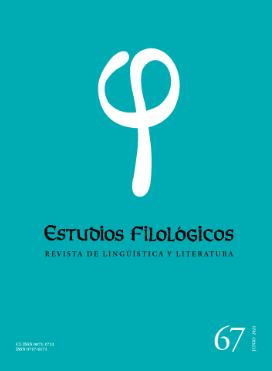The uses of conditional expressions in argumentative dialogues between chilean elderly people
Main Article Content
Abstract
What types of conditional structures do older adults express when they discuss dilemmatic contents, is the research question that motivated this work. To answer this question the importance of conditional and hypothetical thinking is first discussed; then we continue with the analysis of argumentative dialogues between elderly people in dyads and triads in terms of the driven premises of conditional structures, the frequency of conditional structures according to variables such as gender, education, age and geographical location in Chile, and an evaluation of the taxonomic uses of the conditionals found in their opinions. Among the findings it stands out that a large number of conditionals are advice, that another important percentage issued were counterfactual and deontic conditionals, the latter being characterized as practical conditionals that give instructions in an event-action scheme. The most important findings, however, are that the driven premises play a key role in the conditional statements of elderly people, and that the variable that generates a difference when comparing dyads and triads is geographic location, and not education, gender, or specific age interval within elderly.

